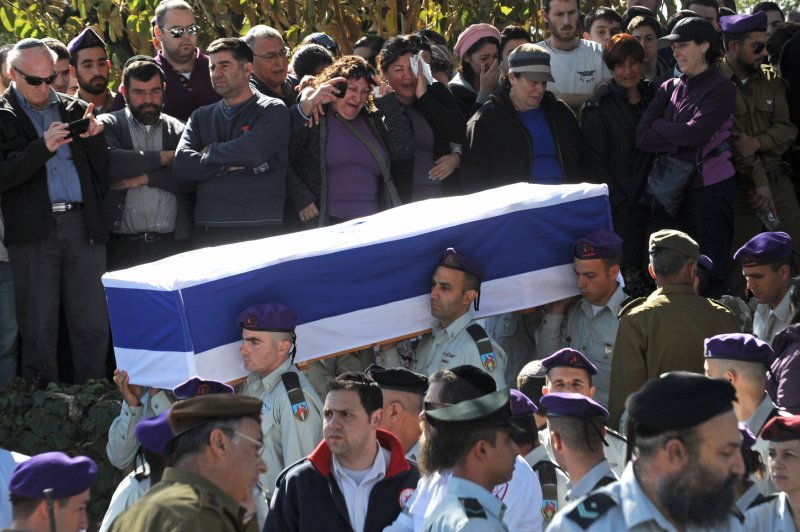1 of 8 | Israeli soldiers carry the flag-covered coffin of Maj. Yochai Kalangel, 25, at his funeral at Mount Herzl Military Cemetery in Jerusalem on Jan. 29. Kalangel was one of two soldiers killed by Lebanon's Hezbollah militants Jan. 28, when an anti-tank missile struck an Israel defense vehicle on patrol near the border with Lebanon. He leaves behind a wife and a 1-year-old daughter. Photo by Debbie Hill/UPI |
License Photo
JERUSALEM, Jan. 29 (UPI) -- Israel and Lebanon assured each other no further military action is planned by either side after a missile attack at the border killed two Israeli soldiers.
Seven other soldiers were wounded Wednesday in the attack by Hezbollah, the Lebanese militia, at Mount Dov on the Israel-Lebanon border. Both sides fired artillery and rockets at one another in the subsequent exchange of gunfire. The attack was a response to a Jan. 18 Israeli drone strike in Syria that killed six Hezbollah militants and an Iranian general.
"We received a message that, from their standpoint, the incident is over, but we are of course prepared for any development," Israeli Defense Minister Moshe Yaalon said on Army Radio. Similarly, a spokesman for Lebanese Prime Minister Tammam Salam said Salam was assured there would be "no further aggression." The guarantees came through the passage of messages, arranged by the United Nations.
Despite the attempts to defuse the situation diplomatically, residents on the border, at a spot on the map where Syria, Israel and Lebanon meet, were concerned the incident was the start of a spillover of the Syrian conflict, a four-year civil war in which Hezbollah is backing the government of Syrian President Bashar al-Assad.
Israeli Prime Minister Benjamin Netanyahu said Wednesday, "Whoever is behind the attack will pay the full price." He blamed Iran for attempting to begin a new military front to fight Israel. A statement by Foreign Minister Avigdor Liebermann, traveling in China, suggested Israel strike back "in a very harsh and disproportionate manner."
Israeli troops in the area of conflict remained on high alert Thursday, fortifying roads along the border with concrete slabs and investigating underground sounds that residents suggested were tunnels being dug under the border.















